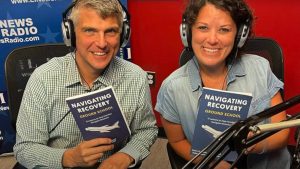
The butterfly effect is the theory that a small change in one state can result in large differences in a later state.
The Butterfly Effect; we wistfully imagine that a butterfly flaps its wings and the weather pattern changes many miles away. In addiction treatment, I see the butterfly effect almost every day.
People maintain addictions for long periods of time. It is a painful disease that lingers for weeks, months, and oftentimes years. Thus, pillaging its way through families, careers, and general health like a tornado. People can maintain addictions for very long periods of time. While everyone around them knows it’s a problem, they’ve learned how to live life without addressing it.
The Family Dynamic is Shifted
Adult children may no longer talk to their dad who drinks. Maybe mom no longer works because of her own drinking. The family dynamic has long shifted to accommodate the addiction.
It’s surprising how fast the entire dynamic of a family can change when someone enters into recovery. Not only does the addict’s life change, the entire family can transform. Not only in the moment, but in the generations to come.
I see this when a parent gets sober. They re-engage with their children and look forward to the future when they can show up for their grandchildren in good health.
The First Flap of the Butterfly’s Wings
In recovery, the butterfly effect starts with a simple phone call. When someone reaches out to Adam Banks Recovery, it’s more than “just a phone call,” even if it doesn’t feel that way. That call is the first step on a bigger journey. I know the huge impact that one call can make in the life of someone suffering from addiction. This also affects everyone who loves them. The first call is the start of a process, the first flap of the butterfly’s wings.
There is a significant shift that occurs when someone picks up the phone to speak with me. They may have been suffering inside for months or years. On that call they’re open and honest about their situation for the very first time. It’s the beginning of a new path, the path of recovery.
When addicts suffer silently, the addiction grows and festers. Fights with family and threatening ultimatums only strain relationships. They don’t change the nature of the situation. I see these patterns in many families and they’ve been going on for years. Without taking action to reject addiction and accept recovery, nothing changes.
The Butterfly Effect Starts With Small Actions
Small actions beget big shifts. Treating addiction starts with concrete actions like picking up the phone. Then it leads to asking for help, learning about the process of recovery. This ends with learning about the cost of treatment, and scheduling time for therapy. These actions may seem small at the time, but they yield massive results.
Once someone “breaks the dam” and makes the first call, change has already begun. They’ve shifted how they think about addiction and have become willing to talk to others about it. They’re taking actions.In a matter of weeks from the first call, they may be well on their way to recovery. Something that was unimaginable for many years becomes possible all because they picked up the phone.
Recovery works like the butterfly flapping its wing. Each small action has a ripple effect into the life of someone suffering and in pain from addiction and all of the lives they touch.
About Adam Banks
Adam Banks is a certified interventionist and the owner of Adam Banks Recovery. After receiving an MBA from the University of Chicago, Adam built a company acquired by United Health Care. His discipline and attention to detail comes from his former career as an airline pilot, holding an ATP, the FAA’s highest license.
Today, Adam is dedicated to helping others achieve long-term sobriety. His work has guided executives, pilots, and physicians on paths to recovery. Adam brings families together through a loving and inclusive approach.
Adam has authored four books on addiction. His recent work, Navigating Recovery Ground School: 12 Lessons to Help Families Navigate Recovery, educates families on the entire intervention process. He also offers a free video course for families considering an intervention for a loved one.
Adam is available for alcohol and drug intervention services in New York, Long Island, the Hamptons as well as nationally and internationally.




